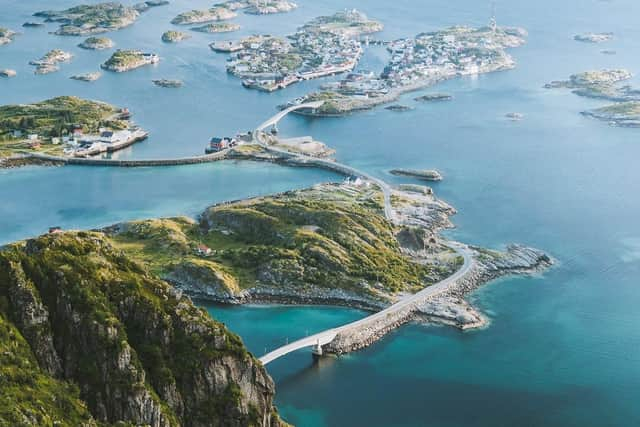Climate change: How Scotland can learn from Scandinavia's road building, tunnels and vast engineering projects – Professor Andy Sloan
The scale, urgency and complexity of the task is unprecedented, with dire consequences should we fail. Every part of society and the economy will have to make significant changes if we are to succeed.
Assuming that increased renewable energy development on its own will have Scotland on track to meet its targets is not an option. To achieve the transformative change our ambition demands, we must harness all opportunities to innovate.
Advertisement
Hide AdAdvertisement
Hide AdOur neighbours in Scandinavia may light the way forward by providing inspiration and advanced innovations, and we can observe how they have applied technology to make significant impact and changes.
Denmark is about to invest £24 billion in its largest-ever infrastructure project, an ‘Energy Island’ located 80km into the North Sea, initially connecting 200 wind turbines. The electricity generated will be distributed to European countries and used on the island to manufacture hydrogen from sea water. This green hydrogen will be used to power marine vessels, industry and aviation.
And in Sweden, green hydrogen is being used in the process of smelting steel, crucially with a by-product of water, not carbon dioxide. Using sector coupling (where industries better integrate to manage consumption) the steel is used in the automotive industry to help reduce its carbon footprint. Scotland may be exploiting the huge potential for renewable energy, but Sweden is demonstrating that a focus on sector coupling could reap significant rewards.
Another example can be found in Norway. With similarities in geography to Scotland, the country is set to construct a 1,000-kilometre highway down its west coast to provide quick and efficient, ferry-free travel between economic hubs and to provide a sustainable future for its rural communities.


Fjords and mountains will be crossed by a series of tunnels and bridges where carbon reduction will be key in its construction. Norway is already investing in materials, research and its already exceptional EV charging network, ensuring new infrastructure contributes to sustainable cross-sector benefits and the reduction of the nation’s carbon footprint.
Of interest to Scottish island communities, the Faroe Islands have been transformed by improved connectivity due to the construction of sub-sea road tunnels. These weatherproof, fast and reliable gateways provide round-the-clock access from the island group to the amenities of the capital, Torshavn. The positive impact on rural communities has been remarkable, with significant carbon benefits.
With an eye on the future, Scotland could draw on the Faroe model and we could be driving to Scotland’s northern and western isles, and more directly to Argyll and Bute.
With the unprecedented challenges the climate emergency brings, we must learn from others beyond our borders, and take advantage of the opportunities they inspire. By doing so, Scotland can enjoy improved economic and societal benefits in future.
Advertisement
Hide AdAdvertisement
Hide AdProfessor Andy Sloan is the managing director of COWI in the UK, one of Scandinavia’s leading engineering consultants, and a fellow of the Royal Society of Edinburgh. The RSE is Scotland's National Academy, which brings great minds together to contribute to the social, cultural and economic well-being of Scotland. Find out more at rse.org.uk and @RoyalSocEd.
A message from the Editor:
Thank you for reading this article. We're more reliant on your support than ever as the shift in consumer habits brought about by coronavirus impacts our advertisers.
If you haven't already, please consider supporting our trusted, fact-checked journalism by taking out a digital subscription.
Comments
Want to join the conversation? Please or to comment on this article.
